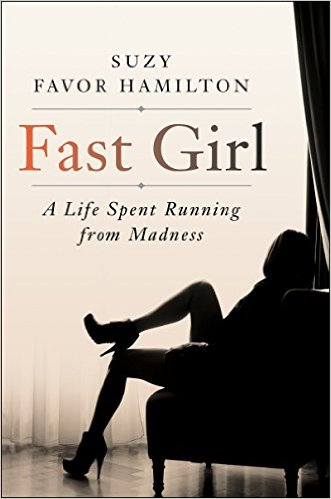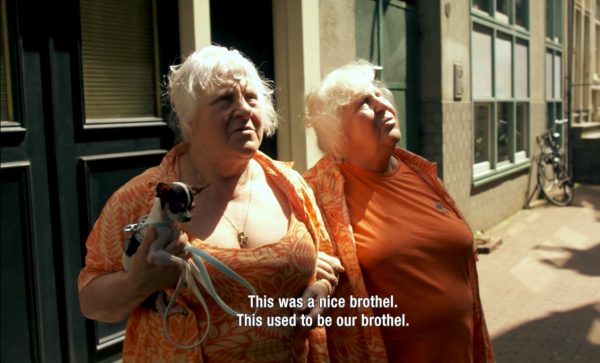 Suzy Favor Hamilton’s autobiography, Fast Girl: A Life Spent Running From Madness, catalogs the Olympic runner’s experience with mental illness, her career shift from professional mid-distance running to high-end escorting, and her eventual outing and diagnosis as bipolar. Following the birth of her daughter and her retirement from running, Favor Hamilton found her career path fraught and unsatisfactory, its travails amplified by her growing problems with postpartum depression and bipolar. Eventually, the media outed her as a sex worker, exacerbating her struggles.
Suzy Favor Hamilton’s autobiography, Fast Girl: A Life Spent Running From Madness, catalogs the Olympic runner’s experience with mental illness, her career shift from professional mid-distance running to high-end escorting, and her eventual outing and diagnosis as bipolar. Following the birth of her daughter and her retirement from running, Favor Hamilton found her career path fraught and unsatisfactory, its travails amplified by her growing problems with postpartum depression and bipolar. Eventually, the media outed her as a sex worker, exacerbating her struggles.
From growing up picked on by her bipolar brother in small town Wisconsin, to her love/hate relationship with the athletic talent she built into a career, and the way that relationship shaped her psyche and primed her for sex work, Fast Girl covers a wide range of material. It is also one of the more honest memoirs I’ve seen on the day-to-day struggle of being bipolar, and how the disorder can escalate.
I’ve been diagnosed with bipolar disorder and other mental illnesses. My thoughts upon reading the book were filtered through my own experiences with the illness: some of these ideas may seem strange if you haven’t lived with bipolar disorder, or lived with someone who copes with it.
In my experience, an important thing to understand about living with bipolar disorder is that it doesn’t always make sense to those who don’t suffer from the disease. Triggers might be minor, like someone looking at you wrong. You might never find out exactly what association triggered your most recent bipolar episode. Sometimes you do know exactly what the trigger is, but even when you know, you can’t really stop it, only remind yourself your perceptions aren’t reflecting reality.
At times, bipolar made my work in a strip club a hell in which I was irrationally afraid of accepting drinks, terrified that every customer was laughing at me. It made me second guess every moment so thoroughly that suicide sometimes felt like a logical post-shift endeavor. At its worst, this illness makes me question everything about myself: my agency, my sanity, my humanity, my very perceptions. My body and mind became communal property- things for others to manage without my input, sometimes overriding my preferences.
Accepting treatment for a mental illness like bipolar can feel like a violation to me. I have to accept that it’s not about me, it’s about what people around me want for me. Maybe I want it, too, but accepting that treatment means accepting I won’t be the arbiter of what’s “right” for myself. That is left to the family members who can no longer handle my outbursts, or the doctor who thinks that no matter how I feel now, it’s worth reaching for something even better by shifting the med dosages, even at the risk of the new doses making me sick.
That level of outside authority is one that women who’ve grown up in a patriarchal society are already used to. We’ve had it enforced from birth that our wishes and agency are second to the men around us, second to our families, second to the comfort of our community, etc. Favor Hamilton’s story is rife with that conflict, even in instances unconnected with her mental health or sex work. From the other department’s coach in college who videotaped her breasts as she ran, with no negative consequences; to the coach who dictated her sex life after her marriage; to the spectators and competitors who claimed her main talent was her beauty; to her dad’s pushiness and embarrassment in response to her swimsuit calendar modeling, the list goes on and on.
 Free from the constraints of network and cable television, the web series has been long touted as the next big thing in entertainment: Content intended for distribution online can be cheaply produced and avoid the ratings system entirely. Without time slots to fill, they can also range in length from feature films to a series of vignettes. Such is the format for Blue, 12 six-to-eight-minute episodes directed by Rodrigo Garcia in a collection of stories about women on the WIGS YouTube channel.
Free from the constraints of network and cable television, the web series has been long touted as the next big thing in entertainment: Content intended for distribution online can be cheaply produced and avoid the ratings system entirely. Without time slots to fill, they can also range in length from feature films to a series of vignettes. Such is the format for Blue, 12 six-to-eight-minute episodes directed by Rodrigo Garcia in a collection of stories about women on the WIGS YouTube channel. Suzy Favor Hamilton’s autobiography, Fast Girl: A Life Spent Running From Madness, catalogs the Olympic runner’s experience with mental illness, her career shift from professional mid-distance running to high-end escorting, and her eventual outing and diagnosis as bipolar. Following the birth of her daughter and her retirement from running, Favor Hamilton found her career path fraught and unsatisfactory, its travails amplified by her growing problems with postpartum depression and bipolar. Eventually, the media outed her as a sex worker, exacerbating her struggles.
Suzy Favor Hamilton’s autobiography, Fast Girl: A Life Spent Running From Madness, catalogs the Olympic runner’s experience with mental illness, her career shift from professional mid-distance running to high-end escorting, and her eventual outing and diagnosis as bipolar. Following the birth of her daughter and her retirement from running, Favor Hamilton found her career path fraught and unsatisfactory, its travails amplified by her growing problems with postpartum depression and bipolar. Eventually, the media outed her as a sex worker, exacerbating her struggles.

